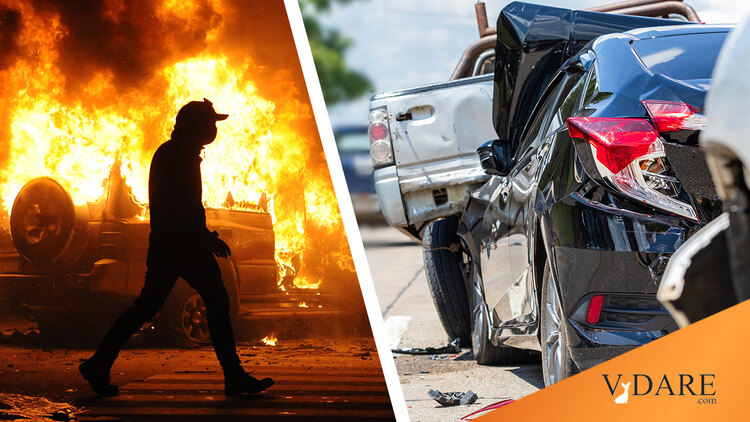
By Steve Sailer
04/06/2023
Earlier: NYT: Vehicle Crashes Surging … But No Blaming The Racial Wreckening
I’ve been banging this drum for 22 months, but, finally, here’s one of the first article in the Respectable Press to mention that the depolicing of bad driving after George Floyd is probably a big reason for the huge surge in traffic fatalities.
America’s roads are more dangerous, as police pull over fewer drivers
April 6, 2023 5:00 AM ET
Martin KasteSome police think a pullback in traffic enforcement may be contributing to more reckless driving.
American roads are deadlier than they were before the pandemic and many are looking at changes in police traffic enforcement as a cause.
Deaths spiked during 2020, and the fatality rate — deaths per million miles traveled — is still about 18% higher now than in 2019.
”It is, unfortunately, an American phenomenon,” says Jonathan Adkins, CEO of the Governors Highway Safety Association (GHSA). Other Western countries did not see the same sustained increase in traffic deaths, and he thinks one important difference is a pullback in policing, following the George Floyd protests of 2020.
“Why do many of us drive dangerously on the roads? Because we think we can get away with it. And guess what — we probably can right now in many places in the country,” says Adkins. “There’s not enforcement out there, they’re hesitant to write tickets. And we’re seeing the results of that.”
Carol Cummings is convinced that’s what’s happening. She’s a retired police officer who lives in Seattle, where she’s noticed an increase in dangerous driving.
“I can’t think of the last time that I have seen a police car with a motorist pulled over on the side of the road that was not involved in something like an accident,” Cummings says.
”But you should take the time to find out if there’s facts to back it up,” she says, so she requested traffic stops data from the city. The result: Traffic citations by police are down about 86%, compared to 2019.
“A lot of that is decisions made by the officer, based on staffing levels and based on call loads,” says Seattle Police Chief Adrian Diaz.
He says his department lost hundreds of officers after the George Floyd protests of 2020, and one thing he had to cut were dedicated traffic details. Patrol officers now spend upwards of 70% of their shifts responding to more urgent calls for service.
“Some of the officers don’t feel like they have enough, adequate time to do the traffic enforcement,” Diaz says.
Similar shortages are hampering police departments around the country.
But in some cases, the reduced traffic enforcement is also a matter of policy. High-profile deadly encounters during traffic stops, such as the 2021 shooting death of Daunte Wright in Brooklyn Center, Minn., have put pressure on many police departments not to pull cars over for minor violations.
Susan Nembhard, a research associate with the Urban Institute, has written about the argument for limiting those stops.
“For people of color and specifically black people, they can actually be one of the most dangerous interactions that they have,” Nembhard says. “And that’s from experiences of not only physical harm when something terrible happens — like a shooting or a murder or something like that — but also emotional harm and mental anxiety and stress.”
Philadelphia, Minneapolis and even the state of Virginia have adopted formal policies limiting stops for minor violations, sometimes called “pretextual stops,” because they give police a justification to stop a car they find suspicious for other, less articulable reasons.
Seattle, too, has instructed officers not to pull cars over for certain non-moving violations, such as expired license tags and obstructions hanging from the rear-view mirror.
“There was a feeling that if there was a way to reduce these violations, that you would reduce potential disparities and stops, and you would also eliminate unnecessary contacts,” says Chief Diaz.
As these new policies reduce “contacts” between police and citizens, some wonder if that has also reduced drivers’ impression that they’ll be stopped for more serious violations, such as running red lights.
“In a lot of places, we’ve shifted from one extreme to the other, where we have where there may have been cases of over-policing where we know people who are black and brown have been disproportionately stopped,” Adkins says. “But perhaps we’ve gone too far on that other side. …
A totally sane article in NPR!
This is a content archive of VDARE.com, which Letitia James forced off of the Internet using lawfare.